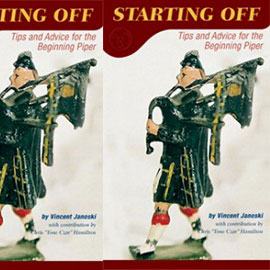On Being an Authentic Bagpiper
 We all live in our own reality bubbles. We become accustomed to thinking that the way we see things is how they are or how they must be. As active, competing bagpipers, I think we collectively form our own piping reality bubble that influences what we play, what we learn, how we play, and who we listen to. Unintentionally perhaps, we tend to bring other pipers into our own reality bubbles which then just perpetuates the problem.
We all live in our own reality bubbles. We become accustomed to thinking that the way we see things is how they are or how they must be. As active, competing bagpipers, I think we collectively form our own piping reality bubble that influences what we play, what we learn, how we play, and who we listen to. Unintentionally perhaps, we tend to bring other pipers into our own reality bubbles which then just perpetuates the problem.
And it is a problem. You don’t have to go far to hear about the troubles of limited thinking and narrow points of view in any arena. Part of the problem is that the kind of “conformity” that exists within the bubble prevents or hampers folks from being “authentic.” This takes the form of a reluctance to share differing opinions about piping matters, a questioning of personal ideas regarding the music and the instrument, as well as perhaps a rejection of a complete rethinking of what you’ve been taught or told. As a result, we stay curled up within the bubble and hobble our own creativity and musical discovery in the process. What follows can be frustration and disillusionment leading to complete disinterest.
Part of the inspiration behind this blog is hacking into the conventional things we think and do as bagpipers. Being a “pipehacker” is about the will to move forward and develop your own ideas. Your own ideas about the instrument, how it’s played, what makes good music good, etc. And it is a constant process. It is all about the old axiom “be true to yourself” upon which our personal happiness is hinged.
Developing as an authentic piper requires taking risks and having the courage to forge your own path. It does not mean adhering to musical ideas that are just plain wrong or that oppose ideas simply for the sake of opposing them. Being an authentic piper also does not mean wearing full No. 1 dress and regurgitating whatever piping parable or conventional musical wisdom told to you by others. And it doesn’t mean holding onto certain musical ideas in a death grip and rejecting any attempt to challenge them.
I’ve written about this before, being a better piper means being a better person. Being a better person means being honest with yourself so you can be yourself and not engage in an endless struggle to be like others or what someone else thinks you should be. Here are some key concepts that can help you build authenticity as a bagpiper and find personal expression in the music.
In knowledge there is power
Find your strengths and focus on what makes it awesome to play pipes and why you are awesome when playing them. Find those reasons and own them. Make them your guide as you seek further learning and practice on the bagpipe. Knowing this about yourself is the key to forging an authentic path and will open up avenues to explore the art that you might not have thought of before.
Find the flow
You do know what people are talking about when they talk about being “in the zone,” don’t you? It is the state of mind when time seems to slow down and things just fall into place and become effortless. In musical terms, it is also called “the groove.” When we talk about “flow,” we talk about the feeling when things are just working, seemingly without effort, when everything else disappears and there is just the act of playing music. The path to fInding your own flow and the tactics that get you there will be different for everybody but they will reinforce your authenticity.
Be what you believe
Gandhi said: “Happiness is when what you think, what you say, and what you do are in harmony.” Finding out what stirs your tea, turns your crank, floats your boat, what have you, and bringing those things into your bagpiping—all the time—is the key to being an authentic piper. What you believe may or may not run counter to accepted orthodoxy and how you do things may or may not be familiar to those around you. It doesn’t matter. What matters is that they are yours and no one else’s and they produce the results you desire.
-
Bro Falldown
 Pipehacker
Pipehacker








